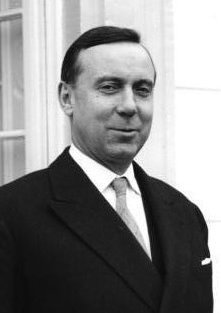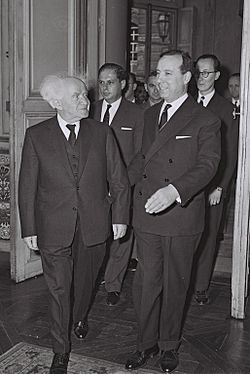Michel Debré facts for kids
Quick facts for kids
Michel Debré
|
|
|---|---|

Debré in 1960
|
|
| Prime Minister of France | |
| In office 8 January 1959 – 14 April 1962 |
|
| President | Charles de Gaulle |
| Preceded by | Charles de Gaulle |
| Succeeded by | Georges Pompidou |
| Minister of Defence | |
| In office 22 June 1969 – 5 April 1973 |
|
| Prime Minister | Jacques Chaban-Delmas Pierre Messmer |
| Preceded by | Pierre Messmer |
| Succeeded by | Robert Galley |
| Minister of Foreign Affairs | |
| In office 31 May 1968 – 16 June 1969 |
|
| Prime Minister | Georges Pompidou Maurice Couve de Murville |
| Preceded by | Maurice Couve de Murville |
| Succeeded by | Maurice Schumann |
| Minister of the Economy and Finance | |
| In office 8 January 1966 – 31 May 1968 |
|
| Prime Minister | Georges Pompidou |
| Preceded by | Valéry Giscard d'Estaing |
| Succeeded by | Maurice Couve de Murville |
| Member of the National Assembly | |
| In office 26 November 1962 – 14 May 1988 |
|
| Constituency | Réunion |
| Personal details | |
| Born |
Michel Jean-Pierre Debré
15 January 1912 Paris, France |
| Died | 2 August 1996 (aged 84) Montlouis-sur-Loire, Indre-et-Loire, France |
| Political party | Radical-Socialist Party (1934–1947) Rally of the French People (1947–1955) Union for the New Republic (1958–1968) Union of Democrats for the Republic (1968–1976) Rally for the Republic (1976–1988) |
| Spouse |
Anne-Marie Lemaresquier
(m. 1936) |
| Children | Vincent (b. 1939) François (b. 1942) Bernard (b. 1944) Jean-Louis (b. 1944) |
| Alma mater | École Libre des Sciences Politiques University of Paris |
| Occupation | Lawyer |
| Awards | |
| Signature | |
| Military service | |
| Allegiance | |
| Branch/service | |
| Years of service | 1939–1945 |
| Rank | Commissioner of the Republic Lieutenant |
| Unit | French Cavalry |
| Battles/wars | World War II : |
Michel Jean-Pierre Debré (born 15 January 1912 – died 2 August 1996) was an important French politician. He was the very first Prime Minister of the French Fifth Republic, which is France's current system of government. Many people see him as the "father" of the modern Constitution because he helped write it. He worked closely with President Charles de Gaulle from 1959 to 1962. Debré was known for being a very strong and determined leader.
Contents
Michel Debré's Early Life and Education
Michel Debré was born in Paris, France. His father, Robert Debré, was a famous doctor who helped create modern pediatrics, which is the study of children's health. Michel's grandfather was a rabbi, but Michel himself was Roman Catholic.
He went to school at Lycée Montaigne and Lycée Louis-le-Grand. He then studied at the École Libre des Sciences Politiques and earned a degree in Law from the University of Paris. He even became a law professor there. In 1934, when he was 22, Debré joined the Conseil d'État, a special government body. In 1938, he started working for the Economy Minister, Paul Reynaud.
Michel Debré's Early Career and World War II
When World War II began in 1939, Debré joined the army as a cavalry officer. He was captured in June 1940 but managed to escape a few months later. He then returned to the Conseil d'État, which was under the Vichy government at the time.
After Germany invaded France's "free zone" in 1942, Debré changed his views on the Vichy government. In 1943, he joined the French Resistance, a secret movement fighting against the occupation. General Charles de Gaulle asked Debré to prepare a list of new local leaders for France after the war. In 1945, Debré helped reform the French Civil Service and created the École nationale d'administration, a school for training future government officials.
Michel Debré's Political Journey
After the war, during the French Fourth Republic, Debré became a senator for Indre-et-Loire from 1948 to 1958. He also started a newspaper called Le Courrier de la colère. This newspaper strongly supported French Algeria (Algeria being part of France) and called for Charles de Gaulle to return to power.
Michel Debré's Family Life
Michel Debré had four sons. They are Vincent Debré, François Debré, Bernard Debré, and Jean-Louis Debré. Bernard and Jean-Louis were twins. Many members of the Debré family have also been involved in politics or other public roles.
Michel Debré as Prime Minister and Other Roles

On 1 June 1958, Michel Debré became the Minister of Justice. He played a very important part in writing the Constitution for the new French Fifth Republic. Once the Constitution was approved, he became the first Prime Minister of France, serving from 8 January 1959 to 1962.
After the Algerian War ended in 1962, President de Gaulle chose Georges Pompidou to replace Debré as Prime Minister. Debré then tried to become a member of the French National Assembly but was not elected. In 1963, he decided to move to Réunion, an island that is an overseas department of France. He wanted to make sure Réunion would not seek independence like Algeria.
Debré returned to the government in 1966 as the Minister of Economy and Finance. After the student protests in May 1968, he became the Foreign Minister. A year later, he became the Minister of Defence under President Georges Pompidou. In this role, he made a controversial decision to take land from farmers on the Larzac plateau to expand a military base. This led to a large protest movement that eventually succeeded.
After Valéry Giscard d'Estaing became President in 1974, Debré became less central in politics. He disagreed with Giscard d'Estaing's foreign policy. In 1979, Debré was elected to the European Parliament. He ran for president in the 1981 French presidential election but received only a small percentage of the votes.
Michel Debré's Time in Réunion Politics
Michel Debré arrived in Réunion in April 1963. He was elected as a Député for Saint-Denis in May, even though some people on the island were against a law he had introduced in 1960. This law allowed government workers in overseas departments to be sent back to mainland France if they were thought to be causing trouble. Debré became a leader for the local right-wing politicians on the island.
To help Réunion stay connected to France and prevent it from seeking independence, Debré started policies to help the island's economy grow. He also opened the island's first family planning center. He worked hard to get Paris to build a second high school in the south of the island, in Le Tampon, because there was only one high school for thousands of people at the time.
From 1968 to 1982, Debré was involved in a program that moved over 2,000 children from Réunion to France. These children, known as Les enfants de la Creuse, were sent to work as laborers in a region called Creuse. This program later became very controversial.
Michel Debré's Political Career Roles
Government Positions
- Minister of Justice: 1958–1959
- Prime Minister: 1959–1962
- Minister of Economy and Finance: 1966–1968
- Minister of Foreign Affairs: 1968–1969
- Minister of Defense: 1969–1973
Elected Positions
European Parliament
- Member of European Parliament: 1979–1980
Senate of France
- Senator for Indre-et-Loire: 1948–1959
National Assembly
- Member of the National Assembly of France for Réunion: 1963–1966, 1973–1988
Local Government
- General Councillor for Indre-et-Loire: 1951–1970
- Mayor of Amboise: 1966–1989
- Municipal Councillor for Amboise: 1959–1989
Michel Debré's Government (1959–1962)
Here are some of the key ministers who served in Michel Debré's government when he was Prime Minister:
- Michel Debré – Prime Minister
- Maurice Couve de Murville – Minister of Foreign Affairs
- Pierre Guillaumat – Minister of Armies
- Jean Berthoin – Minister of the Interior
- Antoine Pinay – Minister of Finance and Economic Affairs
- Jean-Marcel Jeanneney – Minister of Commerce and Industry
- Paul Bacon – Minister of Labour
- Edmond Michelet – Minister of Justice
- André Boulloche – Minister of National Education
- Raymond Triboulet – Minister of Veteran Affairs
- André Malraux – Minister of Cultural Affairs
- Roger Houdet – Minister of Agriculture
- Robert Buron – Minister of Public Works and Transport
- Bernard Chenot – Minister of Public Health and Population
- Bernard Cornut-Gentille – Minister of Posts and Telecommunications
- Roger Frey – Minister of Information
- Pierre Sudreau – Minister of Construction
Changes in the Government Over time, some ministers changed roles or new ones joined:
- In March 1959, Robert Lecourt became Minister of Cooperation.
- In May 1959, Henri Rochereau took over as Minister of Agriculture, and Pierre Chatenet became Minister of the Interior.
- In December 1959, Debré briefly served as interim Minister of National Education.
- In January 1960, Wilfrid Baumgartner became Minister of Finance, and Louis Joxe became Minister of National Education.
- In February 1960, Pierre Messmer became Minister of Armies, and other ministers also changed.
- In November 1960, Louis Joxe became Minister of Algerian Affairs.
- In February 1961, Lucien Paye became Minister of National Education.
- In May 1961, Roger Frey became Minister of the Interior.
- In August 1961, several new ministers joined, including Bernard Chenot as Minister of Justice and Edgard Pisani as Minister of Agriculture.
- In January 1962, Valéry Giscard d'Estaing became Minister of Finance and Economic Affairs.
Images for kids
See also
 In Spanish: Michel Debré para niños
In Spanish: Michel Debré para niños
 | John T. Biggers |
 | Thomas Blackshear |
 | Mark Bradford |
 | Beverly Buchanan |

